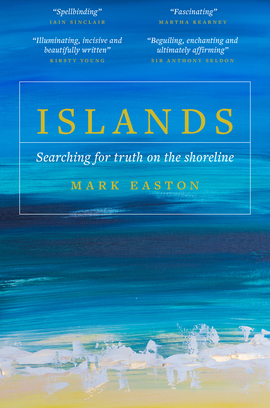‘Enchanting’, ‘illuminating’ and ‘beguiling’ are just some of the adjectives used to describe BBC Home Editor Mark Easton’s new book Islands, but what exactly is it about? Here is Mark himself to introduce the book Iain Sinclair described as a ‘spellbinding serial voyage’.

The first question people ask me about my book is what is it about? This is anything but a stupid question. It is reckoned that, currently, there are several million islands dotted around the planet, from the smallest rocky protuberances that barely count to vast landmasses like Greenland and New Guinea which flirt with being too continental to claim the honour of island status. So, I can’t be writing about ALL OF THEM, can I? Well, yes and no. And quite a lot else too, as it happens.
What inspired a book on islands?
I began thinking about a book on islands while on a beach. As I lay listening to the sound of the waves, it struck me that islands are defined, literally and semantically, by the encircling shoreline. The tidal zone is this rich but hazardous environment separating the island from the world beyond. It was a warm, lazy kind of day and my thoughts then wandered to people and our personal tidal zones. We too, I mused, are shaped by an encircling shoreline, the separations and connections we make in that place where personal independence bumps into alliance and exposure.
How has the pandemic amplified this?
When Covid arrived, my thoughts on this personal islandness heightened. The pandemic tested the relationship between the individual and the community. We were encouraged to close the door on the outside world and to hide away. As the restrictions eased and we tentatively inched towards normality, I thought this would be a good moment to go mudlarking upon the shorelines where ‘us’ meets ‘them’. Yes, I shall write that book.
How to research for this book?
I had already begun to collect stories and ideas about physical islands. I had learned about the academic discipline of nissology, the study of islands. Those active in the field were often passionate about wanting to right a wrong, to convince the world that islands had been given an unfair press. There were arguments about ‘continentalism’, which regarded islands as peripheral and inconsequential, their stories and experiences sidelined to the margins of history.
And the historical impression?
I resolved to tell the island story, from the supercontinent of Pangaea 250 million years ago to one of the newest islands, Surtsey, which bubbled out of the Atlantic in 1963. In between would be the amazing human tale of the first intrepid explorers and colonisers, the invaders and occupiers, the struggles and the achievements of islanders which shaped the world we know today.
That was quite an ambitious idea, but I wanted to take the word ‘ambitious’ to another level. Alongside this sweep of island history, I would also explore the psychological islands that form the great archipelago of humankind. I convinced myself that if I could piece together the experiences and stories of the personal shoreline, one might be able to get a little closer to the truth.
The title
That is what I did and the result is my book, which is not just called Islands; it is subtitled Searching for truth on the shoreline. Finding a title, incidentally, was not easy. There are lots of themes and ideas swirling around like flotsam bobbing on an incoming tide. I am delighted with where we have ended up. The book looks stunning. Just the kind of object one might pick up for a thoughtful read on a beach. Perhaps the same beach where it all began.
Listen to Mark Easton on Biteback Chats Books here to discover why we are still so fascinated by ‘islandness’, the historical idea that Mark finds especially intriguing, and which book he would take to a desert island.
REVIEWS
“A spellbinding serial voyage in which encounters with islands across time are gathered, displayed and reburnished. Memoir becomes morality, as the oldest human myths challenge present neglect and political malfunction.”
Iain Sinclair
“A timely and original exploration of the liminalities of islands and the waters that envelop them: by turns beguiling, enchanting and ultimately affirming.”
Sir Anthony Seldon
“From ancient Crete to modern Canvey, this is a fascinating voyage around island identity, exploring isolation and imagination through a wealth of stories from around the world.”
Martha Kearney
“Illuminating, incisive and beautifully written.”
Kirsty Young
“This is a huge theme which Mark Easton pursues with vigorous and beautifully clear prose. His archipelagic fascination is contagious. Read this and the maps in your mind will never be quite the same again.”
Peter Hennessy
Looking for other insightful reads?
The Social Superpower: The Big Truth About Little Lies by Kathleen Wyatt is a brilliant, wide-ranging study of lies and lying. Wyatt introduces us to a cast of professionals and professional liars who together all help her prove a remarkable thesis: lies hold us together as much as they push us apart and they play a vital role in a healthy society.
